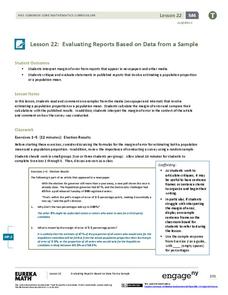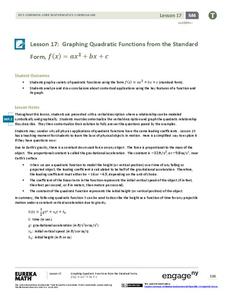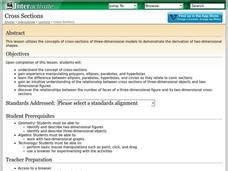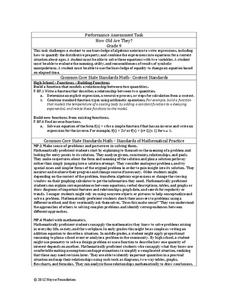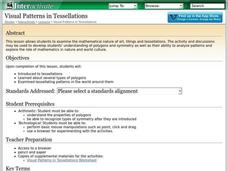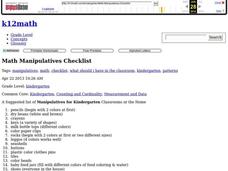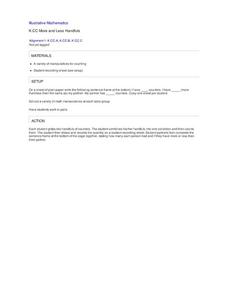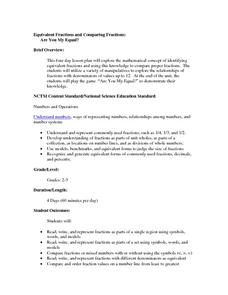EngageNY
An Application of Linear Equations
Just how far will the Facebook post go? Lead a discussion on how to manipulate the sum of a geometric series to figure out a formula to find the sum at any step. The plan contains an alternative to the discussion with more...
EngageNY
Evaluating Reports Based on Data from a Sample
Statistics can be manipulated to say what you want them to say. Teach your classes to be wise consumers and sort through the bias in those reports. Young statisticians study different statistical reports and analyze them for...
EngageNY
Solving Exponential Equations
Use the resource to teach methods for solving exponential equations. Scholars solve exponential equations using logarithms in the twenty-fifth installment of a 35-part module. Equations of the form ab^(ct) = d and f(x) = g(x) are...
EngageNY
Graphing Quadratic Functions from the Standard Form
Use context to explain the importance of the key features of a graph. When context is introduced, the domain and range have meaning, which enhances understanding. Pupils use application questions to explore the key features of the graph...
EngageNY
Solving Equations
Teach solving equations through an exploration of properties. Before pupils solve equations they manipulate them to produce equivalent equations. The activity switches the focus from finding a solution to applying properties correctly.
North Carolina State University
Shapes
Expose youngsters to 3-D objects in a hands-on learning activity involving marshmallows and toothpicks. Engage your young mathematicians by introducing them to 3-D shapes by means of a story book. Explore 3-D shapes by manipulating...
PBS
Add, Subtract and Multiply Fractions
Your future chefs will appreciate this comprehensive instructional activity where learners practice operations on fractions using pizza and soup analogies. Learners begin with a pizza analogy that requires the learners to...
Curated OER
Is That Your Final Answer?
This unit on integers includes a pre-test, a post-test, four spreadsheets, and links to an interactive web-site to support the learning of integer operations. Access to computers and the Internet are imperative to this unit. The lessons...
Resource Room
Multisensory Teaching: Positive and Negative Integers
Working with thermometers, sixth graders compare the value of positive and negative numbers. Plenty of teacher suggestions and independent practice ideas are presented. This website links to two more parts in this first of three integer...
Shodor Education Foundation
Cross Sections
Use this activity on cross-sections of three-dimensional shapes in your math class to work on algebra or geometry Common Core standards. The lesson includes a list of relevent terminology, and a step-by-step process to illustrate the...
Inside Mathematics
How Old Are They?
Here is a (great) lesson on using parentheses! The task requires the expression of ages using algebraic expressions, including the distributive property. Pupils use their expressions to determine the individual ages.
August House
The Magic Pot
The Magic Pot by Patricia Coombs is the theme of this multidisciplinary lesson plan. Early readers first take part in a read aloud and grand conversation about the story's details. Then, they get to work practicing their skills in...
Shodor Education Foundation
Visual Patterns in Tessellations
Geometers explore the concept of tessellations. They use a tessellation applet to manipulate shapes and design their own tessellation using the applet.
Curated OER
Addition and Subtraction Facts to 20
Fact families, and the relationship between addition and subtraction are the foucs of this lesson. Learners explore strategies to help with their addition and subtraction facts. They use doubles, related facts, and fact families to help...
Curated OER
Volume of Solids: Algebra/Geometry Institute
Use this volume of solids lesson to have learners find the surface area and volume of cylinders, pyramids, and prisms. They place cubes inside three-dimensional figures to determine the volume. Worksheets and answers are provided.
Curated OER
Literature/Math Crossover Lesson Plan - Word Problems
First graders, after listening to the story I Can Lick 30 Tigers Today! think of a word problem of their own. They do this at their desks in their pre-assigned learning groups.
Curated OER
Counting and Math Concepts
Students practice counting to the number three. In this number sense lesson, students practice counting to the number three by using various objects. Students arrange and count the objects.
Curated OER
Patterns
Explore early algebra by participating in a pattern identification activity using a random assortment of different household materials. The class creates, completes, and analyzes different patterns with the help of leggos, buttons,...
Curated OER
Fractions and Paper Folding
In this fraction lesson, students manipulate paper by folding it to create different shapes and sizes, they explore the concept of fractions, and discuss their observations as a class. This is a great lesson for getting students...
Curated OER
More and Less Handfuls
Working as a pair, two kindergartners will sit at a table and will pick two handfuls of counters. They will combine their individual handfuls into one, and count their own selection. They will then draw and record their count on a record...
Core Knowledge Foundation
A “Whole” Lot of Fraction Fun!
Young mathematicians are introduced to fractions in a unit that helps them to understand parts of a whole.
Curated OER
George's Place
Here is another in the interesting series of lessons that uses money as a learning tool. This one is especially clever! During the lesson plan, pupils pretend they are eating at "George's Place" diner. Small groups are given one bag of...
Curated OER
Equivalent Fractions and Comparing Fractions
How can you tell if fractions have equal value? Use various collaborative activities to demonstrate the ways to determine whether or not fractions are equivalent.
EduGAINs
Introduction to Solving Linear Systems
Word problems offer class members an opportunity to learn the concept of solving linear systems using graphs. Individuals choose a problem based upon preferences, break into groups to discuss solution methods and whether there...



